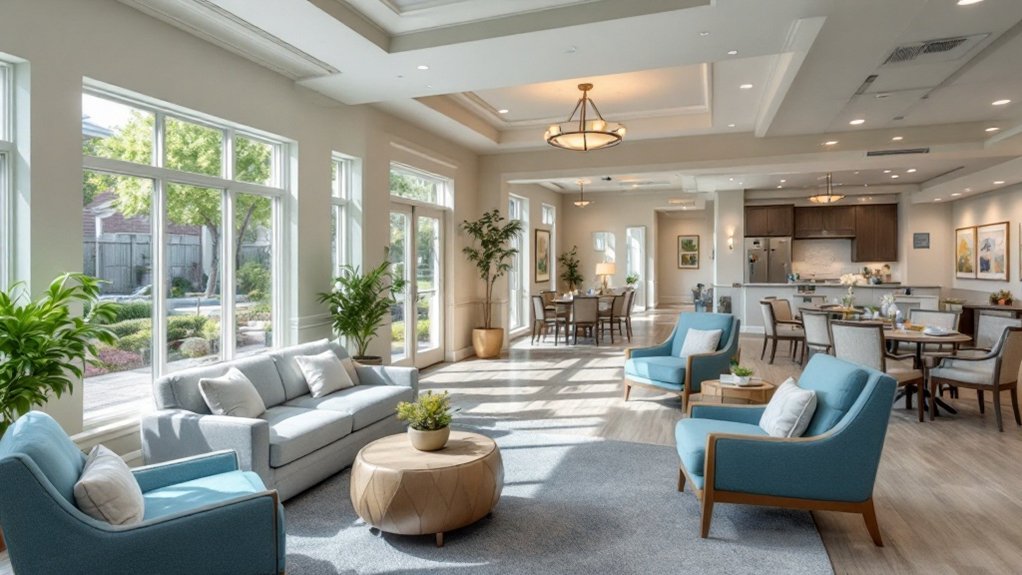Your memory care costs will cover essential services including 24/7 specialized supervision, cognitive therapy sessions, structured activities, and housekeeping, with monthly fees ranging from $4,000 to $12,000 nationally (median: $6,450). Base rates encompass safety protocols, secured entrances, monitoring systems, and memory-enhancing therapies, though medication management and private accommodations may incur additional expenses. Further exploration reveals extensive financial assistance options and location-specific cost variations.

Five distinct cost components shape the contemporary memory care landscape, with monthly expenses ranging from $4,000 to $12,000 nationally. You'll find the national median hovering at approximately $6,450 per month, with considerable geographical variations exemplified by Vermont's position as the most expensive state and South Dakota as the most affordable. The cost structure typically reflects the facility's location, with urban centers commanding premium rates due to elevated operational expenses and market demand. Trained staff members provide round-the-clock specialized care essential for residents with cognitive impairments.
Your base memory care costs encompass extensive 24/7 supervision, specialized dietary programs, housekeeping services, and cognitive therapy sessions designed to maintain neurological function. Communities often include memory-enhancing therapies as part of their standard programming to support cognitive wellness. These facilities prioritize structured activities to maintain residents' cognitive abilities and emotional health. The inclusion of safety protocols, such as secured entrances and monitoring systems, represents a fundamental aspect of memory care facilities' operational framework, distinguishing them from standard assisted living environments and contributing to their higher cost basis.
Memory care facilities provide round-the-clock supervision and specialized services, setting them apart from traditional assisted living through enhanced safety measures and therapeutic support.
You'll need to factor in supplementary expenses that may not be included in the base rate. These encompass medication management services, specialized therapy programs, and one-time administrative fees such as move-in costs or community entrance charges. The selection of private versus shared accommodations significantly impacts your monthly expenditure, with private rooms commanding a premium of 15-30% above shared spaces.
Financial assistance mechanisms exist to help offset these substantial costs. You may qualify for long-term care insurance coverage, Medicaid waivers designed specifically for memory care services, or veterans' benefits if you or your spouse served in the military. Additionally, many facilities offer sliding scale fees or partner with non-profit organizations to provide more accessible care options for qualified individuals.
Your extensive cost analysis should incorporate both immediate and long-term financial planning considerations. The facility's reputation, staff-to-resident ratio, and documented outcomes in memory care provision often correlate directly with cost structures.
You'll find that while premium facilities command higher rates, they frequently deliver enhanced specialized services, superior staff training, and more sophisticated cognitive support programs, potentially offering better value despite elevated costs.
Frequently Asked Questions
How Long Does the Average Resident Stay in Memory Care?
Your typical memory care stay averages two to three years, though individual experiences vary considerably based on disease progression and health factors.
You'll find that some residents move within months, while others may require care for up to a decade, particularly those with slower-progressing forms of dementia.
Medical complications and facility capabilities can influence your length of stay, potentially necessitating moves to skilled nursing facilities.
Can Couples Live Together in a Memory Care Facility?
You'll find that many memory care facilities accommodate couples through various living arrangements, with approximately 40% of communities offering shared residential options.
While both partners can live together in specialized apartments, you'll need to evaluate the facility's policies, as some require both residents to meet memory care criteria.
Your options include two-bedroom units or connected suites, though availability and configurations vary by location and provider.
What Certifications Should Memory Care Staff Have?
Memory care staff should hold a Certified Dementia Practitioner (CDP) credential, which requires completion of the Alzheimer's Disease and Dementia Care Seminar.
You'll want to verify that staff members have obtained state-mandated certifications, along with specialized training in person-centered care approaches.
The Joint Commission's Memory Care Certification and CARES or AGEucate programs demonstrate advanced competency in evidence-based dementia care practices and nonpharmacological interventions.
Are Memory Care Residents Allowed to Leave the Facility?
Yes, you're legally entitled to leave memory care facilities for family events and personal matters without losing Medicare coverage, as clarified by CMS guidelines.
Your facility must implement appropriate safety protocols upon your return while maintaining your resident rights.
While most facilities require notification and documentation of departures, they can't restrict your movement or mislead you about coverage loss during temporary absences.
How Often Can Family Members Visit Memory Care Residents?
You'll typically have flexible access to visit your loved one in memory care, though specific policies vary by facility.
Most centers allow daily visits during designated hours, usually between 8 AM and 8 PM.
You'll need to follow established protocols, including signing in, wearing masks, and maintaining hygiene standards.
Some facilities offer "essential caregiver" designations, enabling extended visitation hours and enhanced access for primary family members.









